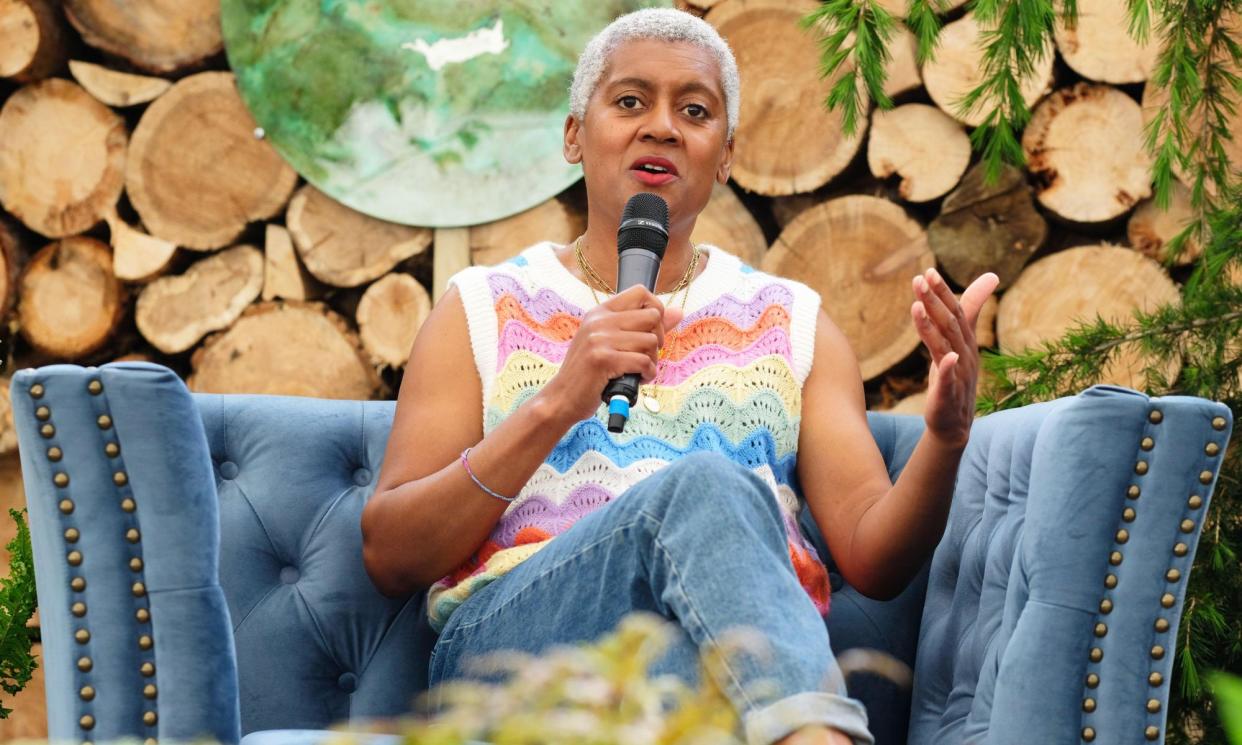‘It can be done’: peat-free garden to feature at Hampton Court flower show

A completely peat-free garden will be showcased at the Hampton Court Palace flower show so the public can “have a chat about peat-free gardening” and learn how to do it themselves.
Peat-free compost has been a divisive topic in the gardening world, with some gardeners arguing that it is not as good as the peaty stuff for growing plants.
Now Arit Anderson, a Gardeners’ World presenter, is creating a garden for the Royal Horticultural Society (RHS) to show that forsaking peat does not mean you have to have a dull garden. Her garden will be full of colour and texture, with one area of naturalistic planting to mimic an untouched peatland, and another looking like a recognisable domestic garden, with shaded and sun-loving borders and beds.
Peat, which is dug up from bogs, is full of carbon and nitrogen, and holds water well, which helps plants flourish. For years it was a key component of the compost used in horticulture and sold in garden centres.
Bogs are one of the most critical carbon sinks in the UK, and often have extremely biodiverse and fragile habitats. Wildlife and environmental groups have made banning peat a critical demand in the past few years and the UK government announced a ban on peat for gardeners in 2022, which was supposed to be enacted this year. But this ban has now been delayed until 2030 at the earliest, and the relevant legislation to make it happen has still not gone through parliament.
The ban has faced opposition from parts of the farming and horticulture industries, with the Horticulture Trade Association saying when it was announced: “Due to the current lack of quality alternative materials to peat, an immediate ban on peat could impact significantly on the availability of growing media. This would mean that the UK’s 30 million gardeners would be faced with products which have not gone through a lengthy enough quality assurance process, and which would have higher costs.”
And so progressive members of the industry have been left to promote peat-free gardening without government support. At Hampton Court flower show, held from 2-7 July in the grounds of the palace, Anderson’s garden will be an example of gardening that can be done without destroying the UK’s precious bogs.
Though avoiding peat compost is relatively easy these days, some plants are still grown in pots with plugs containing peat. Anderson’s garden aims to be informative and help gardeners and industry transition to peat-free by showcasing what can be achieved and empowering people to grow plants using sustainable alternatives. It will feature more than 2,000 annuals, perennials, shrubs and trees.
Anderson said: “To do this communication about where peat comes from was really important to me. It’s really important we have gardeners and the public talking about and understanding how to keep peat in the ground.
“This garden is going to be a community space where we can all have a good old chat about peat. People will be able to walk through it and there will be a tiny mini boardwalk over a peat habitat, there will be an immersive video, lots of communication about what peat is and where it comes from and why it shouldn’t be in our gardens.
“We want to be able to have visitors come and see that every single plant in the garden is peat-free. We are using ones that are being grown on trials at the moment; we need people to be able to feel confident they can see a plant that is grown healthily without peat. We have shrubs, flowers, trees and even vegetables as well.”
Visitors to the garden will also be able to enjoy a series of talks and workshops to promote growing mediums that do not include peat.
Richard Benwell, the chief executive of Wildlife and Countryside Link, said: “A shining marigold medal to Hampton Court for showing leadership in peat-free horticulture. The government has promised to ban the sale of horticultural peat products ‘as soon as parliamentary time allows’. Other important regulations, like new nature rules for national parks and regulations to ratify the Global Ocean Treaty, are also trapped in this legislative limbo. There’s still time before this parliament is over; now it’s a question of political will to make these important environmental changes happen.”
Alistair Griffiths, the director of science and collections at the RHS, added: “We’re delighted that Hampton will be host to this peat-free garden from plug to plot. Industry and gardeners are showing huge resolve in their ambition to be peat-free and the garden will showcase how it can be done with no less colour or quality. From 2026, our legacy peat policy will aid the transition by accounting for the legacy peat that is likely to be found in older and larger garden plants.”
The RHS will ban peat from its gardens and shows by 2026, when all plants raised will be required to have been grown entirely peat-free. Any potting action after this date must also be peat-free, for plants to be shown, exhibited or sold through its shops.


